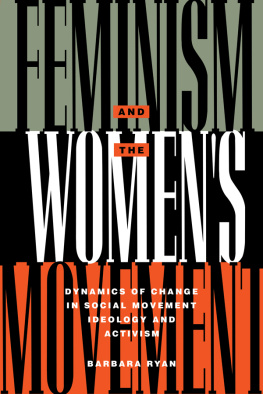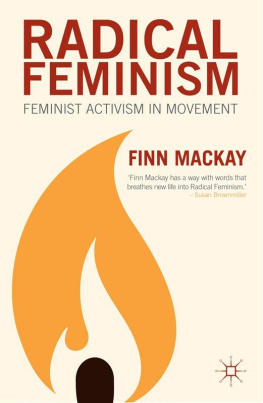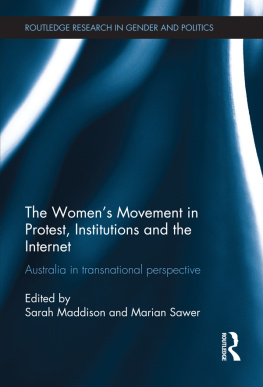FEMINISM AND THE WOMENS MOVEMENT
PERSPECTIVES ON GENDER
Editorial Board:
Myra Marx Ferree, University of Connecticut
Virginia Sapiro, University of Wisconsin-Madison
Kay Deaux, CUNY Graduate School and University Center
Pleasure, Power, and Technology: Some Tales of Gender, Engineering, and the Cooperative Workplace
Sally Hacker
Black Feminist Thought: Knowledge, Consciousness, and the Politics of Empowerment
Patricia Hill Collins
Understanding Sexual Violence: A Study of Convicted Rapists
Diana Scully
Maid in the U.S.A.
Mary Romero
Black Women and White Women in the Professions: Occupational Segregation by Race and Gender, 19601980
Natalie J. Sokoloff
FEMINISM AND THE WOMENS MOVEMENT
DYNAMICS OF CHANGE IN SOCIAL MOVEMENT, IDEOLOGY AND ACTIVISM
Barbara Ryan
Published in 1992 by
Routledge
An imprint of Routledge, Chapman and Hall, Inc.
270 Madison Ave,
New York NY 10016
Published in Great Britain by
Routledge
2 Park Square, Milton Park,
Abingdon, Oxon, OXI4 4RN
Transferred to Digital Printing 2008
Copyright 1992 Barbara Ryan
All rights reserved. No part of this book may be reprinted or reproduced or utilized in any form or by any electronic, mechanical or other means, now known or hereafter invented, including photocopying and recording, or in any information storage or retrieval system, without permission in writing from the publishers.
Library of Congress Cataloging in Publication Data
Ryan, Barbara,
Feminism and the womens movement: dynamics of change in social movement ideology and activism / Barbara Ryan.
p. cm.(Perspectives on gender)
Includes bibliographical references and index.
ISBN 0415905982.ISBN 0415905990 (pbk.)
1. FeminismUnited StatesHistory19th century. 2. FeminismUnited StatesHistory20th century. I. Title. II. Series: Perspectives on gender (New York, N.Y.)
HQ1426.R93 1992
305.42 0973dc20 9291
CIP
British Library Cataloguing in Publication data also available
ISBN 0415-905982 (HB)
ISBN 0415-905990 (PB)
Publishers Note
The publisher has gone to great lengths to ensure the quality of this reprint but points out that some imperfections in the original may be apparent
To my mother,
Edith Eileen Dougherty Ryan
and children,
David, Paul, and Jeanne Harris
There are many people who have contributed to this research. For productive discussions and continuous encouragement I thank Norma Mendoza, Donna Theis, Geneie Williamson, Chris Guerrero, Mary Ann Randell, Judy McNeilly, and the members of the Thursday on Friday Discussion Group, most notably Jan Whitaker, and Eric Plutzer.
Bill Berg, Sylvia Pedraza-Bailey, David Pittman, Don Strickland, Marvin Cummins, and Henry Berger provided needed assistance in the early years of formulating and defending my dissertation topic, which began this work. Rebecca Klatch added to my thinking about womens activism in general; and Joyce Trebilcot deserves my deep gratitude for broadening my understanding of feminism in countless ways. As the chair of my dissertation committee, John Zipp provided me with strong support from the beginning of my thinking about doing this research. It is difficult for me to find the right words which will express how much he contributed to this work. Without doubt, his impact can be found in a project which increasingly became more focused and analytical.
The people mentioned above were living in the St Louis area when I began this research, most were students or faculty at Washington University. It saddens me to think how a university that provided so many of us with an environment to meet and develop our ideas no longer has a sociology department. For all my negative feelings about that administrative decision, I remember the years I spent there fondly and I appreciate the research funds Washington University provided for the early stage of this study. In addition, faculty development awards which contributed to my ability to complete this work came from Widener University, for which I am very appreciative.
Input from other social movement scholars, particularly those involved with research on the womens movement, have sharpened my thinking and impacted in critical ways the final analysis developed in this book. For sharing their insights, criticisms, and suggestions I thank Myra Marx Ferree, Verta Taylor, Judith Lorber, Clarence Lo, Pamela Oliver, Steven Buechler and Janet Saltzman Chafetz. I particularly want to thank Myra Marx Ferree for encouraging me to publish this work and then providing me with guidance on how to do that.
Lisa Freeman, before she left Allen and Unwin was my first editor, and her enthusiasm for this book is appreciated. When Allen and Unwin became Unwin Hyman, Loren Osborne became my new editor and she provided encouragement until Unwin Hyman became a part of HarperCollins where the fine editorial skills of Sarah Dann at HarperCollins contributed to this book. While editing the final copy of this work, I was notified that HarperCollins had sold the Unwin Hyman Academic program to Routledge, Chapman and Hall. Thanks to Max Zutty and James Geronimo, this fourth and last transition was accomplished smoothly with Routledge in getting this book to press.
I am indebted to Scott Graczyk, Judy McNeilly, and Suzanne Wells for volunteering their time to transcribe interviews, Karen Zimmerman for arranging to have interviews transcribed by work study students in the Womens Studies Program at Washington University, and Valorie Perry for translating my editing notes into readable form. Students in my social movement class engaged me in lively discussions on feminism and the womens movement; I particularly want to acknowledge Davida Karol Craig, Joanne Halley, and Christine Lee for conducting four of the interviews that were used in this project.
Those others who also suffered through the process of this research and writing deserve special recognition. To this end I have dedicated this book to my mother and my children for providing me with love and care, and for giving me their understanding and patience through these years; and to Standford Snyder I acknowledge my deepest appreciation for his continuing support in the midst of my distractions over finishing this work.
Finally, I want to thank the feminist activists who generated the data this research is based on. It is these activists, and the many who came before them, that have created an environment in which womens generalized discontent could be organized into a vibrant and long lasting social movement. I thank them for their commitment to improving womens lives and for sharing their knowledge with me. Without their efforts this book would not have been possible.









